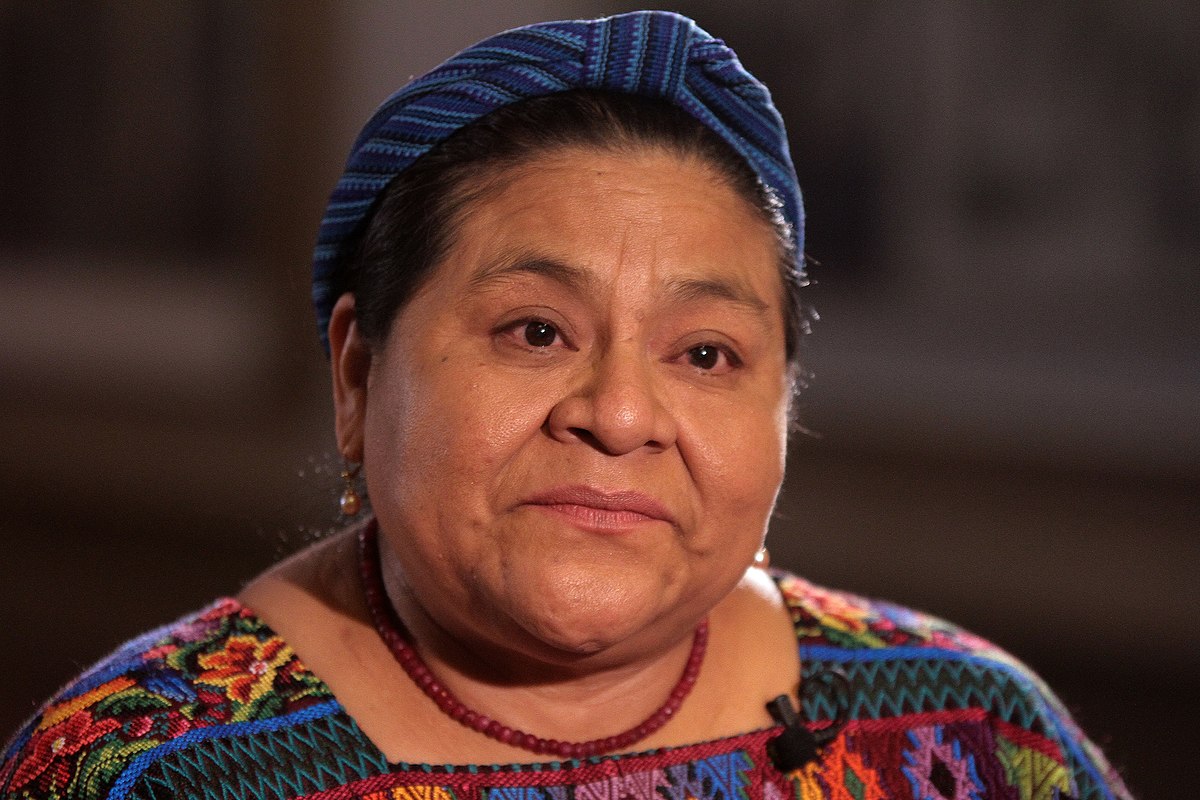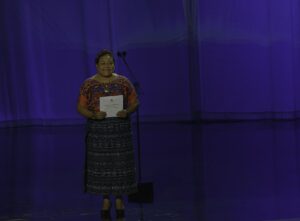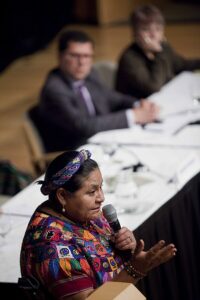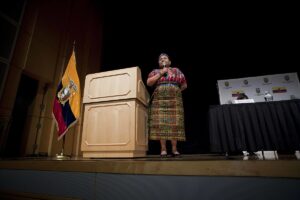April 6, 2024
The Role of Rigoberta Menchu and Impact in Social Justice

A person who does not know of their roots, origin, and culture is like a puzzle missing its most important piece. Rigoberta Menchú, a winner of various prizes, but most importantly, the recipient of the 1992 Nobel Peace Prize in recognition of her work in trying to bring social justice to indigenous societies. But let’s go back to explore her life and what she went through before that and see how important and effective her strong communications were.
Rigoberta Menchú was born on January 9, 1959, in Quiché, Guatemala. Menchú came from a family of peasant workers. While Menchú was growing up, soldiers attacked their community, forcing people to sell and give up their lands for a tiny amount of money. After her father tried to organize a group of people to confront the government for these injustices, he was imprisoned and tortured until he died at the hands of soldiers. “Although the family of Vicente did not stop, the Committee of Peasant Unity (CUC) went underground in 1978.”1

Guatemalan, taken by Jimmy Baikovicius. | Courtesy of Wikipedia Commons.
“After that, soldiers captured Menchú’s brother, Patrocinio, in 1979, and tortured him. They showed Patrocinio’s wounds to the locals, then doused him with gasoline and set him on fire in public. The soldiers didn’t stop there; they kidnapped her mother, tortured and raped her, and then left her to die in the forest. She died before the villagers could find her.”2 The soldiers murdered Menchú’s brother to threaten the indigenous community so they wouldn’t interfere or start taking to the streets to fight for their rights. I can’t imagine how she survived all these atrocities she went through just over some land. Most of her family was dead. Rigoberta Menchú had no other choice because she was young so, she escaped and went to Mexico in 1981.
“Words are her only weapon. Rigoberta learned the language of the oppressor to use it against them.” 3 At the age of 19, Rigoberta Menchú only spoke the Mayan language and had to learn to speak and write in Spanish so that she could be heard and share her story worldwide. She recognized that Spanish would be a powerful tool against the Ladinos and those causing harm to her community. Rigoberta learned Spanish through interactions with nuns and biblical associations, a process that took her three years. During this time, she had to use this method of learning to be heard because speaking only the Mayan language and other Guatemalan languages was limiting. She learned to be able to communicate not only with her community but also with other indigenous people from different parts of Guatemala.
The oppressive Guatemalan government subjected more than 25,000 indigenous members to torture and disappearance. Menchú, still a teenager, faced unimaginable tragedies, including the deaths of her father, brother, and mother. These losses were not peaceful; they were unjust and shocking. Driven by her experiences, while Menchú found refuge in Mexico, she became an activist. “In 1982, Menchú traveled to Europe and the United States, speaking on the atrocities in Guatemala. Her oft-debated autobiography, “Me llamo Rigoberta Menchú y así me nació la conciencia” published in 1983 is a testimony to her experiences and those of her people. The book was published in Spanish not Mayan so that it would reach more readers and was transcribed and edited by anthropologist Elizabeth Burgos from interviews conducted with Menchú.”4 Her efforts gained recognition, especially after the publication of her book, “I, Rigoberta Menchú.” This powerful autobiography detailed her impoverished youth and the horrifying torture-murders of her family members.
“Menchu speaks to us as a woman and as a Maya. She has a very clear vision of the situation of women in Guatemala. In Maya culture, women identify with Mother Earth, they must be mothers, but the horror of seeing their children die from malnutrition or other diseases caused by poverty makes life difficult for Guatemalan mothers.”5 What Menchú highlights is that women in Guatemala are often stereotyped as housewives, expected to serve their husbands and manage household responsibilities. Unfortunately, they also endure various forms of abuse and are treated as inferior. Men, on the other hand, hold the power and are seemingly unrestricted in their actions.

“Transnacionales y Derechos Humanos”, taken by
Chancellery of Ecuador | Courtesy of Wikipedia Commons
This situation has persisted for years, and despite the passage of time, little has changed. The struggle faced by Guatemalan mothers is particularly pronounced when they lack education or occupy a low social status. Poverty exacerbates their challenges, leaving them unable to adequately support their families. As a Guatemalan, from my experience the life in Guatemala has been difficult for many families due the minimal wages that make it more difficult to grow economically. Additionally, the lack of healthcare and medical attention can be challenging. There is also the status within the society which play a role in how women are treated and if they can be courageous enough to make changes but that can come with discrimination especially against indigenous people. “Discrimination and racism attack feeling and is a deep value, but if there was a balance in people there would be mutual respect and empathy.” As we reflect on Menchú’s words, let us recognize the resilience of these mothers and stand in solidarity with them. The life of Guatemalan mothers is difficult when you don’t have education or a high social status. This also means these mothers don’t have the ability to support their family. With the poverty in Guatemala is also a conflict that prevents seeing changes and it’s sad to see how many children die every day.
Rigoberta Menchú, a Guatemalan Indian-rights activist, endured immense hardships in her quest for equality and freedom for indigenous peoples. Her journey was marked by discrimination, attempted kidnappings, and even rape. Yet, she persevered, determined to make other countries listen and help transform Guatemala into a nation with equal rights and freedom for indigenous communities. Rigoberta Menchú tirelessly worked to publicize the rights of Guatemala’s indigenous people during and after the Guatemalan Civil War (1960-1996). Additionally, Menchú became a United Nations Ambassador for indigenous people and collaborated with the Catholic Church to advocate for social reform. Her efforts in learning 23 indigenous languages led to official recognition, emphasizing the importance of cultural identity. Her fight for equality, freedom, and justice continues to this day, resonating throughout the world.6
She came up with the idea of going out and finding different methods to be heard and let people know what she went through and not only her concerns but also concerns of other indigenous peoples. Here is where Rigoberta Menchú’s activism had some recognition. Later on, after the book, “I, Rigoberta Menchú” was published, many people read it worldwide, however, some criticisms and controversy emerged claiming what she said was not true. The criticisms and slander against her were many, among them, the most prominent one was from David Stoll. He called Menchú a liar and a communist agent using terrorism as a way to create war within democracy in the west. “Stoll’s strategy appears to be distracted attention from the army’s culpability for its atrocities that include the lives of more than 200,000 Guatemalans.”7 With these criticisms, many people doubted if everything Menchú had said was true or simply a lie, however, many people did believe her. According to the criticisms she was receiving, it was only to distract and defame Menchú, and thus prevent the truth from coming to light. Obviously, her work and writing was appreciated and effective. In 1992, she was awarded the Nobel Peace Prize for her ongoing commitment to social justice and reconciliation in Guatemala.

Rigoberta Menchú is a role model for many people, and I include myself in that because being an international student from Guatemala, in the field of computer science and cybersecurity, she encouraged women regardless of their race or culture to think globally and step out of our comfort zone. As we can see in many countries in Latin America, women have less voice and strength to move forward and become someone recognized, this leads to a lot of oppression that women should be housewives or take care of their husbands. This limits our potential and Menchú’s character as a woman encourages us and gives us motivation that women can also achieve great triumphs and fight for what we want.
Through the history of Rigoberta Menchú, the impact is not just for women but also she embodies a general voice for all people. The reality of her early life, seeing the death of her loved ones on her land and having to seek help in other countries like Mexico, the United States, and Colombia was shocking. Menchu chose to put the pieces together and transform silence into a discourse that gave her strength and courage to fight for the freedom and rights of her people.
- Anita Price Davis, “Rigoberta Menchú.,” in Salem Press Biographical Encyclopedia (Salem Press, September 1, 2022), Research Starters. ↵
- Anita Price Davis, “Rigoberta Menchú.,” in Salem Press Biographical Encyclopedia (Salem Press, September 1, 2022), Research Starters. ↵
- Stacey Schlau, “Rigoberta Menchú, Chronicler,” NWSA Journal 3, no. 2 (1991): 269 ↵
- Anita Price Davis, “Rigoberta Menchú.,” in Salem Press Biographical Encyclopedia (Salem Press, September 1, 2022), Research Starters. ↵
- Stacey Schlau, “Rigoberta Menchú, Chronicler,” NWSA Journal 3, no. 2 (1991): 272. ↵
- Stacey Schlau, “Rigoberta Menchú, Chronicler,” NWSA Journal 3, no. 2 (1991): ↵
- David Stoll and Arturo Arias, “Rigoberta Menchú,” PMLA 117, no. 1 (2002): 125. ↵
Tags from the story
Guatemala
Menchú
Nomination-Civic-Engagement-and-Social-Action
Rigobert Menchú
Women’s Activism
Recent Comments
Nicholas Pigott
This was a fascinating piece on Rigoberta Menchu, a woman I most certainly did not know myself. Massive props to you on this article detailing Menchu and her role in social justice. Menchu is a role model to all of us, and I appreciate your efforts to bring this great woman to light here as a Guatemalan. Congratulations on your nomination!
26/04/2024
11:01 am
Naya Harb
That is a captivating topic! I was so happy to learn and read about this woman. This is the first time that I hear from her and I will definitely be doing more research on her. Your article was amazing, great job! I really enjoyed reading it and I was upset about her losing her family in that way. Congratulations on being nominated!
26/04/2024
11:01 am
Madison Hinojosa
I must say, this article is incredibly well-written! The attention to detail and eloquent choice of words truly make this piece a pleasure to read. The way the information is presented is not only informative but also engaging, capturing the reader’s interest from start to finish. Overall, the article’s superb quality is a testament to the writer’s skill and dedication, showcasing a mastery of language and storytelling that is truly commendable.
27/04/2024
11:01 am
Ana Barrientos
Wow! Absolutely incredible, she truly is an inspiration for many indigenous people and more specifically indigenous people from Guatemala. I was so shocked that her brother and her family was killed, that is absolutely horrific. That is hard to overcome, but I’m glad she was able to be a voice for indigenous woman in Guatemala. I enjoyed how well you told her story, amazing job!
25/04/2024
11:01 am